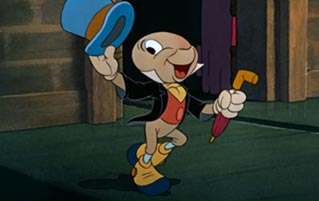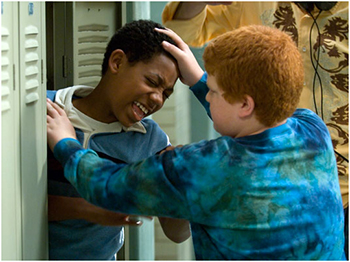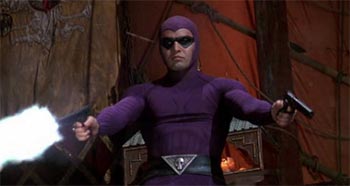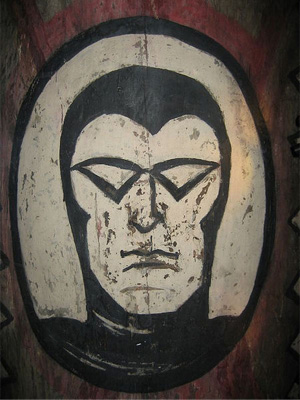5 Random Things We Had No Idea Had Tons Of Fans Overseas

Hollywood assumes that Western pop culture is fairly universal. If Star Wars succeeds in America, it should do well in the rest of the world. If Uncle Larry's Star Battle Adventure flops in America, the people of Vietnam probably aren't going to get much out of it either. But sometimes that's not the case. Sometimes a creation resonates so hard with another culture that not even the most turtlenecked of market researchers could have predicted its success. Like how ...
Mexicans Love Morrissey
Morrissey made a name for himself as the frontman for The Smiths, then embarked on a solo career as the godfather of sad indie songs. He has plenty of fans across the glove, but there's one group in particular that really loves his downer ballads: Mexicans (and Mexican-Americans).
Why does a British pop star's tear-filled droning speak to such a different culture? Well, they have more in common than you'd think. Morrissey is a first-generation immigrant, born in Ireland, and while that might not seem like a big deal now, there was a time when Ireland was full of people who didn't much care for the English, and used explosions to express that sentiment. Having been born Irish but raised English, Morrissey was trapped between two worlds, and he wrote songs about the dilemma. Unsurprisingly, many Mexican-Americans could identify with the feeling of being torn between two cultures. So Mexicans have Morrissey-themed karaoke nights, cover artists, and even a Morrissey convention, which is surely more fun than it sounds.
Morrisey's music has also been compared to Mexican ranchera ballads -- slow, moody pieces about lost loves and other grim subjects. So it's a beautiful story about how cultural isolation can bring two groups together in their shared misery, and show us that life is awful no matter what color your skin is.
Growing Pains Was Huge In China
Actor Alan Thicke died in 2016, and while there's always a lot of media attention when a celebrity dies, there was a disproportionately massive flood of sympathy coming from one unexpected source: China. Why did China care so much about the death of an American actor? Because he was the sitcom dad for their entire Generation X.

When China first emerged from decades of isolation in the late '80s, they didn't have much exposure to Western culture. That all changed with Growing Pains, one of the first American shows dubbed into Chinese and made widely available to the public. It provided Chinese families with their first window into Western life and values. And shockingly, Westerners weren't all that different from them! There were some differences, like four-child families and Thicke being a stay-at-home dad, which was about as common in China as a stay-at-home werewolf. But it was relatable enough for Chinese viewers to see that their propaganda had been taking a few liberties over the years.
While the show only ran for four years, it had a huge impact on younger viewers, exposing them to an entirely new world. And when Thicke died, part of their childhoods died with him.

Everybody Hates Chris, Except Brazil
Chris Rock grew up in an unusually terrible part of Brooklyn, where he spent his childhood tormented by bullies who thought Carrie was a motivational video. He fictionalized his childhood over four seasons of Everybody Hates Chris. It was critically acclaimed, but never really embedded itself in the zeitgeist.

Oh, except in Brazil. Despite its lackluster American ratings, the show would go on to gain a massive fanbase in Brazil. It's still airing in reruns there today. Why? Because it's one of the few American shows available in Brazil that features an all-black cast, despite the fact that a large part of Brazil is of African descent. It seems Brazil's own entertainment world is about as diverse as a Fox News panel.
In 2016, Tyler James Williams' (young Chris) Instagram account was flooded with quotes from the show in Portuguese, demonstrating its ongoing popularity in a very silly way. Because the internet never does anything in moderation, it soon became too much for Williams. He asked his followers to lay off a bit ... and you already know how the internet responded to that request.

Papua New Guinea Made Folk Art Of The Phantom
The Phantom hails from a simpler time, when all you needed to fight crime was a few guns and a magnificent purple bulge. Despite continual publication since 1936, the superhero has languished in obscurity amongst all but the nerdiest of nerds, a situation not helped by the creative miscarriage of the 1996 movie.

And yet there are people in Papua New Guinea absolutely nuts for this guy. The country experienced an influx of Western culture after World War II, and that included Western comic books. But while everyone else was reading Superman, Guineans decided that the Phantom was the perfect subject for their traditional war shields.

Guineans create huge shields out of tree trunks and then decorate them with symbols. Western pop culture obviously gave them a lot of new subjects, and according to an art dealer, the Phantom became their favorite for two reasons. First, he's all about protecting his home, and second, his nickname is The Man Who Cannot Die, which is an awesome slogan for a shield. Technically that's false advertising, since the Phantom is a title passed down from father to son whenever the last guy dies, and the whole "can't die" thing is just what they've been telling criminals for 300 years. But there's only so much backstory you can fit on a shield.
Donald Duck Is Synonymous With Christmas In Sweden
Only the most hardcore Disney fans are familiar with the television special From All Of Us To All Of You, if only because it was released in 1958, and surely no one from that distant year is still alive today. It's a cute special, but dated and forgettable ... unless you're Swedish, in which case it's a bigger part of Christmas than Jesus.

In Sweden, the show is known as Kalle Anka och hans vanner onskar God Jul (Donald Duck And His Friends Wish You A Merry Christmas), and it became so popular that it airs without fail, every single year at 3:00 p.m. on December 24th. This is despite the fact that, aside from some vignettes tying the show together, most of the shorts have nothing to do with Christmas. To show how seriously Swedes take it: In 1982, the "Ferdinand The Bull" short was replaced with "The Ugly Duckling," and it became a national news story. Public outrage was so swift that this dire sin was immediately rectified for the following year. Other attempts to alter the program or its scheduling have also been met with reactions generally reserved for the burning of holy texts.
Up to half the country watches the special every single year, often making it the year's most popular show, and Swedes can quote it at each other like die-hard Rick And Morty fans. Even if you won't watch, don't bother making other plans. The whole country shuts down for an afternoon like an unusually wholesome cult. Why is it so popular? Well, the special originally aired when Swedes were first starting to own TVs, there was only one channel to watch, and it was the only glimpse of American animation they'd get all year. So consider this a valuable lesson in cornering a market.
Henrik Magnusson also enjoys meaningless pop culture and online harassment masquerading as satire in comic form.
Get to writing your own enduring niche cult hit with a beginner's guide to Celtx.
Support Cracked's journalism with a visit to our Contribution Page. Please and thank you.
For more, check out 7 Things From America That Are Insanely Popular Overseas and 7 Random Pieces Of US Culture That Are Weirdly Huge Overseas.
Follow us on Facebook, and we'll follow you everywhere.